Top cancer doctor criticises Labour’s public smoking ban: ‘Let people make their own decisions’
A world-renowned oncologist with more than 40 years’ experience and a stint as former head of the World Health Organization’s cancer programme has strongly opposed Labour’s proposed ban on smoking in public places.
Professor Karol Sikora, a cancer specialist, said he hated smoking like any doctor, adding that Keir Starmer’s ban on outdoor smoking, which would have made it illegal to light up in places like pub gardens, went a step too far.
In a post on X that has been viewed almost 1.5 million times, he says: ‘I hate smoking, it’s a terrible habit, terrible for your health and I urge everyone to quit.
“But at some point we have to trust people to make their own decisions. If we banned a harmful habit, we would live a very boring life.
‘Where do we draw the line? Alcohol? Junk food? Driving? Contact sports? Why should we even go out?’
Professor Karol Sikora, a cancer specialist, said he hated smoking like any doctor, but added that Keir Starmer’s ban on outdoor smoking, which would make it illegal to light up in places like pub gardens, went a step too far.
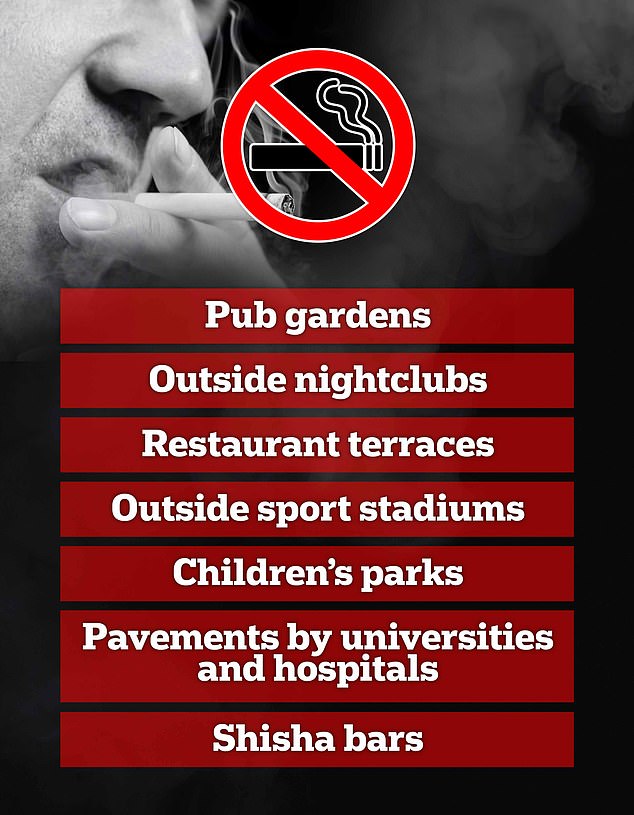
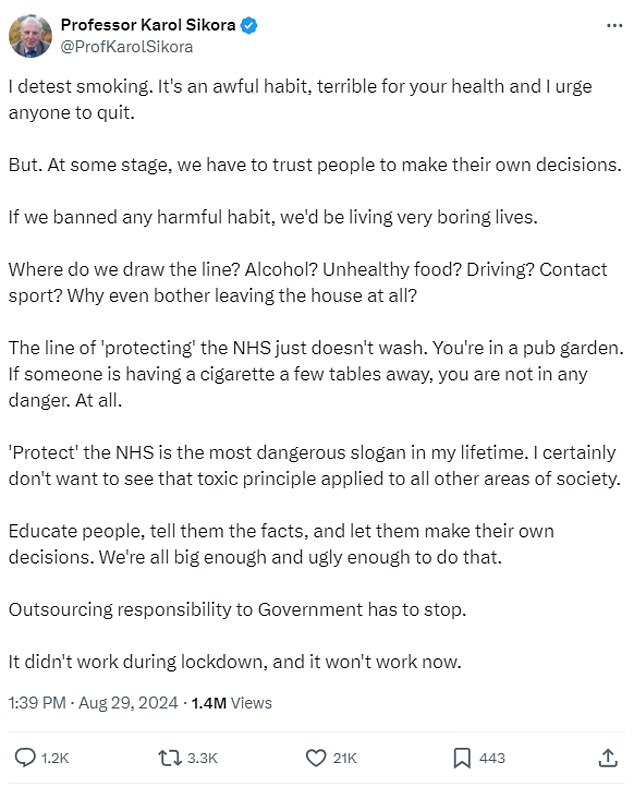
He added that the nanny state policy would not do much in terms of health protection: ‘You’re sitting in a pub garden. If someone is having a cigarette a few tables away, you’re not in any danger at all.’
“Educate people, tell them the facts and let them make their own decisions. We’re all big enough and ugly enough to do that.”
‘The outsourcing of responsibility to the government has to stop. It didn’t work during the lockdown and it won’t work now.’
He also told MailOnline: ‘Given the cost of enforcing it and the cost to the hospitality industry, in terms of public health gain, it’s just not worth it.’
He added that previous policies, including the 2007 indoor smoking ban, had made a “huge difference” in reducing smoking rates.
However, he said this would not happen through a ban on outdoor activities.
“A ban on smoking in public outdoor spaces is too far-reaching, excessive and impossible to enforce,” he said.
“And those who have decided that they are going to smoke, no matter what, continue to do so anyway.”
He added that someone outside would have to be surrounded by “about 10 smokers” to be at significantly greater risk of health problems from second-hand smoke.
Under Labour’s reported measures, the public could be banned from lighting up cigarettes in pub gardens, at football grounds and even outside nightclubs.
Pavements along universities and hospitals, restaurant terraces and shisha bars are also expected to become smoke-free zones as the new Labour government takes even tougher action than former Prime Minister Rishi Sunak planned.
But some health experts are positive about the plan.
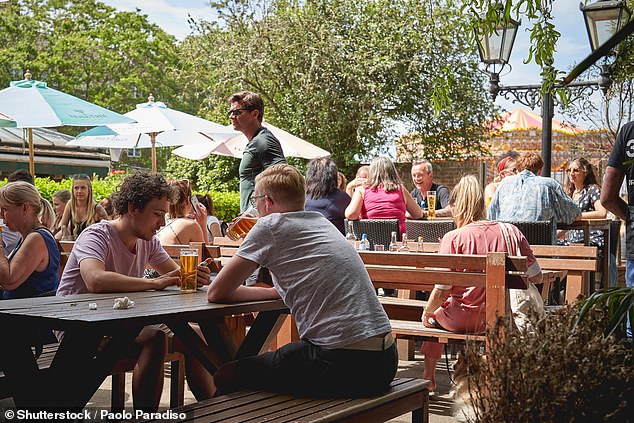
Under the strict measures, customers could be banned from lighting up cigarettes in pub gardens, at football pitches and even outside nightclubs.
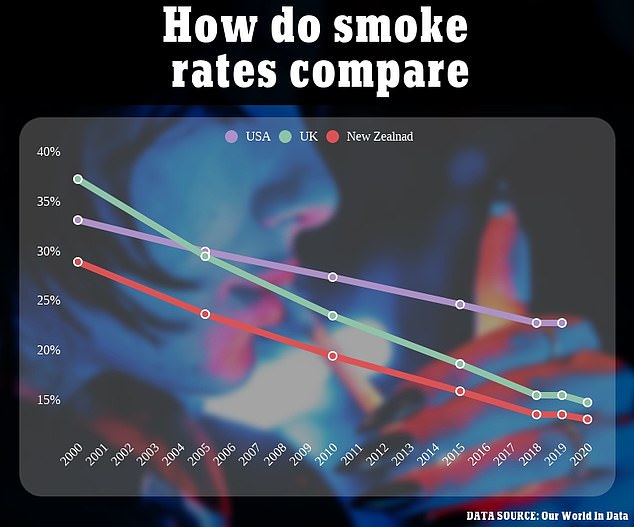
According to research platform Our World In Data, 13.7 percent of New Zealanders smoked in 2020, compared to 15.4 percent of Britons and 23 percent of Americans.
Dr Lion Shahab, an expert in health psychology and co-director of the Tobacco and Alcohol Research Group at University College London, told this website: ‘The intention of this legislation is probably not necessarily to reduce exposure to secondhand smoke. There will be some small effects, but they will be quite small because the wind will blow the smoke away.
‘There are probably health benefits to not smoking outside.
‘But the gains achieved with this will probably be less than indoors (smoking ban).’
However, Dr Shahab concluded: ‘The biggest impact will be changing norms around smoking behaviour.
‘Smokers who consider quitting will do so. And if there are fewer opportunities to light up a cigarette, they are less likely to start smoking again.’
After indoor smoking was banned in 2007, it encouraged people to quit smoking in their own homes, research shows.
A ban on outdoor smoking could have similar benefits and “have a positive impact on public health,” Dr. Shahab said.
The 7,000 chemicals in tobacco, including tar and other substances that can narrow arteries and damage blood vessels, are thought to be responsible for some of the damage smoking does to the heart.
Nicotine, a highly addictive toxin found in tobacco, has now been linked to dangerous increases in heart rate and blood pressure.
Smoking also releases toxic gases, such as carbon monoxide, which replaces the oxygen in the blood, making less oxygen available to the heart.
Currently, only a handful of countries worldwide have stricter anti-tobacco laws. Last year, Mexico introduced a total ban on smoking in public places.
The move, first approved in 2021, also includes a ban on tobacco advertising, This means that cigarettes are not even allowed to be displayed in shops.
Meanwhile, smoking is banned in Canada on public transportation and in all indoor public spaces, including restaurant and bar patios.
Deborah Arnott, chief executive of the charity Action on Smoking and Health (ASH), said the government was “delivering on what the public expects: no more inhaling tobacco smoke in places like children’s play areas and seating areas outside pubs, restaurants and cafes”.
However, she added that it is important to ensure there are still outdoor spaces where people can smoke “in the open air, rather than inside the house”.
Meanwhile, Dr Layla McCay, director of policy at the NHS Confederation, said she was ‘clearly in favour of measures that help end smoking’.
She told BBC Radio 4: ‘It is absolutely the health challenge of our time. It is the single biggest cause of preventable disease in the UK.
‘We are therefore pleased that progress is being made and that there is a clear commitment to effectively tackling one of the biggest causes of health inequalities in the UK.’
It is reported that the Prime Minister plans to push through the bill.
He is also said to have the support of chief medical officer Professor Chris Whitty, while ministers will argue the economic benefits outweigh the potential costs.
Ministers are expected to claim that smoking costs £21.8 billion in health spending.
The original indoor smoking ban, introduced in the UK by Tony Blair in 2007, was blamed by some for the closure of pubs, especially smaller pubs that were unable to adapt.
It follows more recent anti-smoking measures, such as a ban on menthol cigarettes in 2020 and a ban on smoking in cars with children in 2015.
However, it is still unclear how far a smoker must walk from, for example, a café or restaurant before he or she can legally light a cigarette.
The country aims to be ‘smoke-free’ by 2030, at which point only five percent of the population will be allowed to possess cigarettes.
This comes just months after the House of Commons overwhelmingly passed the second reading of the Tobacco and Vaping Act, bringing the government closer to enforcing the law that anyone born after 1 January 2009 will never be able to legally buy cigarettes again.
If the law ultimately passes, it would mean that the age at which people can purchase cigarettes would increase by one year every year.
Although the number of smokers is decreasing, there are still around 6.4 million smokers in the UK due to the growing population.
It is estimated that around 500,000 hospital admissions in England each year are due to smoking and that smoking costs the economy £17 billion a year.
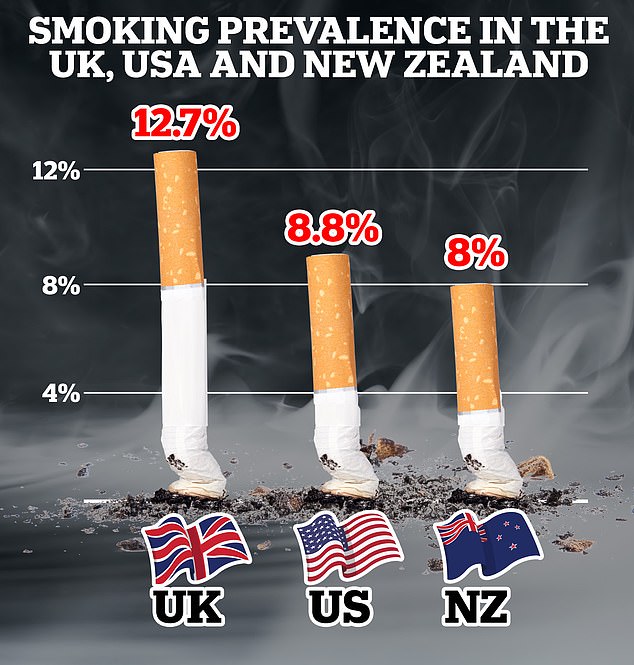
The Organisation for Economic Co-operation and Development’s 2023 health report found that 12.7 percent of Britons over the age of 15 smoke cigarettes daily, much higher than the US and New Zealand, which recently introduced similar phased smoking bans.
Data from Cancer Research UK also shows that there were around 57,600 diagnoses of cancer caused by smoking in 2023, compared to 49,325 in 2003.
Tobacco can cause 16 different types of cancer. Lung cancer alone accounts for 33,000 cases each year.
A Department of Health and Social Care spokesperson said: ‘We do not comment on leaks.
‘Smoking claims 80,000 lives every year, puts enormous pressure on our NHS and costs the taxpayer billions.
‘We are determined to protect children and non-smokers from passive smoking. We are considering a range of measures to finally make Britain smoke-free.’
